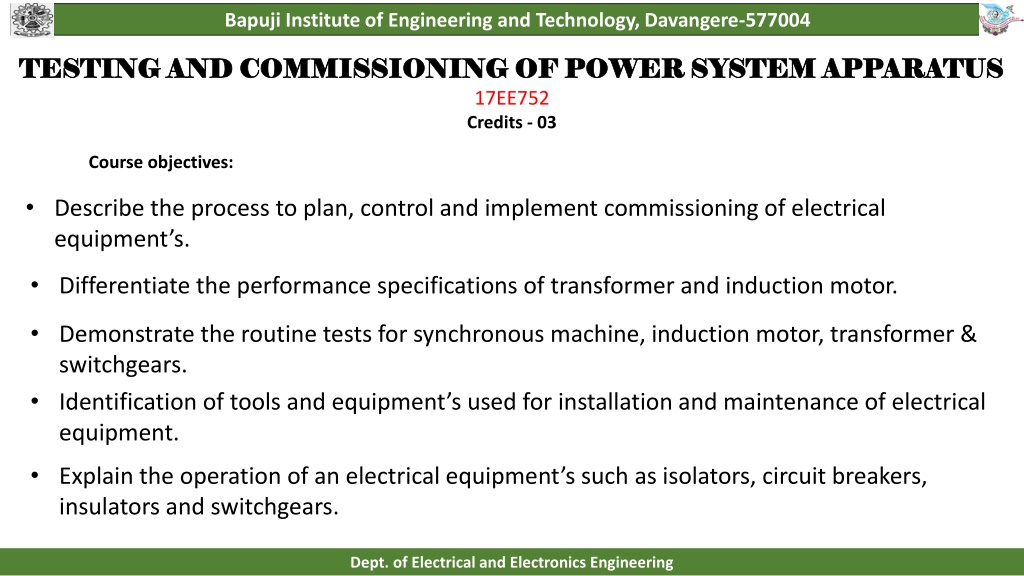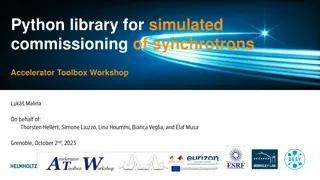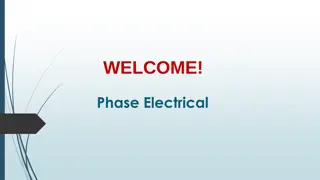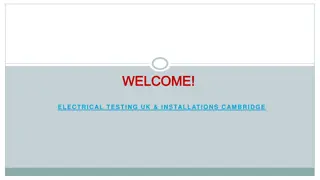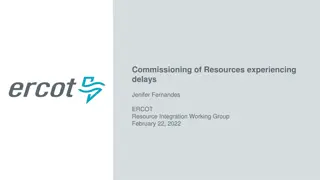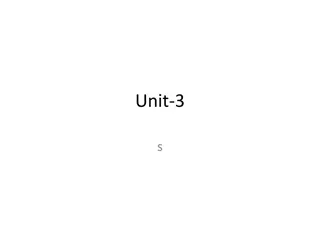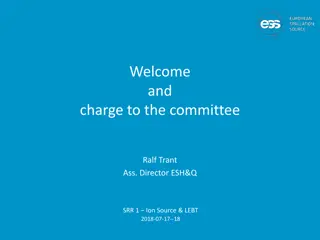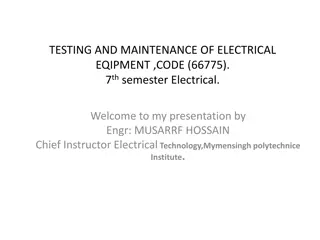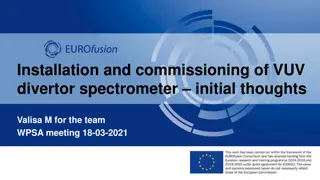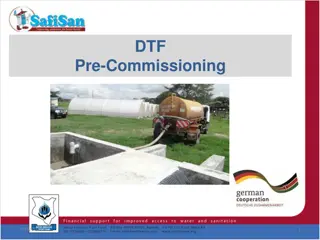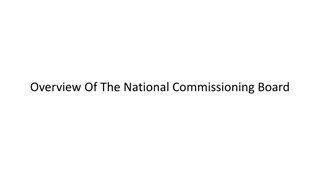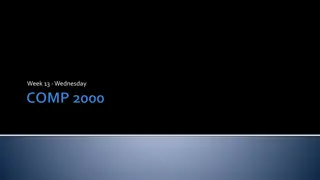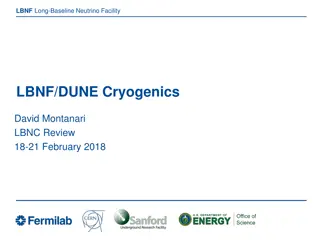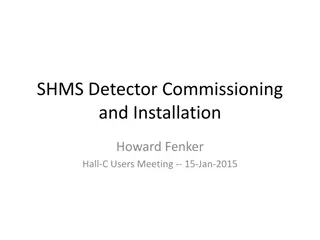Electrical Equipment Testing and Commissioning Course at Bapuji Institute
This course at Bapuji Institute of Engineering and Technology in Davangere focuses on testing and commissioning of power system apparatus. It covers planning, controlling, and implementing commissioning processes, as well as performance specifications of electrical equipment like transformers and induction motors. Students learn routine tests for synchronous machines, induction motors, transformers, and switchgears. The program emphasizes identifying tools and equipment for installation and maintenance, understanding the operation of electrical components, and achieving engineering outcomes such as problem analysis, design solutions, and ethical practices.
Download Presentation

Please find below an Image/Link to download the presentation.
The content on the website is provided AS IS for your information and personal use only. It may not be sold, licensed, or shared on other websites without obtaining consent from the author. Download presentation by click this link. If you encounter any issues during the download, it is possible that the publisher has removed the file from their server.
E N D
Presentation Transcript
Bapuji Institute of Engineering and Technology, Davangere-577004 TESTING AND COMMISSIONING OF POWER SYSTEM APPARATUS TESTING AND COMMISSIONING OF POWER SYSTEM APPARATUS 17EE752 Credits - 03 Course objectives: Describe the process to plan, control and implement commissioning of electrical equipment s. Differentiate the performance specifications of transformer and induction motor. Demonstrate the routine tests for synchronous machine, induction motor, transformer & switchgears. Identification of tools and equipment s used for installation and maintenance of electrical equipment. Explain the operation of an electrical equipment s such as isolators, circuit breakers, insulators and switchgears. Dept. of Electrical and Electronics Engineering
Bapuji Institute of Engineering and Technology, Davangere-577004 Program Outcomes or Graduate Attributes 1. Engineering knowledge: Apply the knowledge of mathematics, science, engineering fundamentals, and an engineering specialization to the solution of complex engineering problems. 2. Problem analysis: Identify, formulate, review research literature, and analyze complex engineering problems reaching substantiated conclusions using first principles of mathematics, natural sciences, and engineering sciences. 3. Design/development of solutions: Design solutions for complex engineering problems and design system components or processes that meet the specified needs with appropriate consideration for the public health and safety, and the cultural, societal, and environmental considerations. 4. Conduct investigations of complex problems: Use research-based knowledge and research methods including design of experiments, analysis and interpretation of data, and synthesis of the information to provide valid conclusions. 5.Modern tool usage: Create, select, and apply appropriate techniques, resources, and modern engineering and IT tools including prediction and modeling to complex engineering activities with an understanding of the limitations. 6. The engineer and society: Apply reasoning informed by the contextual knowledge to assess societal, health, safety, legal and cultural issues and the consequent responsibilities relevant to the professional engineering practice. Dept. of Electrical and Electronics Engineering
Bapuji Institute of Engineering and Technology, Davangere-577004 7. Environment and sustainability: Understand the impact of the professional engineering solutions in societal and environmental contexts, and demonstrate the knowledge of, and need for sustainable development. 8. Ethics: Apply ethical principles and commit to professional ethics and responsibilities and norms of the engineering practice. 9. Individual and team work: Function effectively as an individual, and as a member or leader in diverse teams, and in multidisciplinary settings. 10. Communication: Communicate effectively on complex engineering activities with the engineering community and with society at large, such as, being able to comprehend and write effective reports and design documentation, make effective presentations, and give and receive clear instructions. 11. Project management and finance: Demonstrate knowledge and understanding of the engineering and management principles and apply these to one s own work, as a member and leader in a team, to manage projects and in multidisciplinary environments. 12. Life-long learning: Recognize the need for, and have the preparation and ability to engage in independent and life-long learning in the broadest context of technological change. Dept. of Electrical and Electronics Engineering
Bapuji Institute of Engineering and Technology, Davangere-577004 Electrical Tools, accessories: Tools, Accessories and Instruments required for Installation, Maintenance and Repair Work, India Electricity Rules, Safely Codes Causes and Prevention of Accidents, Artificial Respiration, Workmen s Safety Devices. Transformers: Installation, Location Site Selection, Foundation Details, Code of Practice for Terminal Plates, Polarity and Phase Sequence, Oil Tanks, Drying of Winding sand General Inspection. Commissioning Tests As Per National and International Standards - Volts Ratio Earth Resistance, Oil Strength, Insulation Tests, Impulse Tests Polarizing Index, Load Temperature Rise Tests. Specific Tests for Determination of Performance Curves like Efficiencies, Regulation Etc., Determination Mechanical Stress Under Normal and Abnormal Conditions. Dept. of Electrical and Electronics Engineering
Bapuji Institute of Engineering and Technology, Davangere-577004 Synchronous Machines: Specifications as per BIS Standards. Installation - Physical Inspection, Foundation Details, Alignments, Excitation Systems, Cooling and Control Gear, Drying Out. Commissioning Tests - Insulation, Resistance Measurement of Armature and Field Windings, Wave Form and Telephone Interference Tests, Line Charging Capacitance. Performance Tests -Various Tests to Estimate the Performance of Generator Operations, Slip Test, Maximum Lagging Current, Maximum Reluctance Power Tests, Sudden Short Circuit Tests, Transient Sub Transient Parameters, Measurement of Sequence Impedances, Capacitive Reactance, and Separation Of Losses, Temperature Rise Test, and Retardation Tests. Factory Tests -Gap Length, Magnetic Eccentricity, Balancing Vibrations, Bearing Performance. Dept. of Electrical and Electronics Engineering
Bapuji Institute of Engineering and Technology, Davangere-577004 Induction Motor: Specifications. Installation- Location of Motors and its Control Apparatus, Shaft Alignment for Various Coupling, Fitting of Pulleys and Coupling, Drying of Windings. Commissioning Tests -Mechanical Tests For Alignment, Air Gap Symmetry, Tests for Bearings, Vibrations and Balancing. Specific Tests -Performance and Temperature Raise Tests, Stray Load Losses, Shaft Alignment, Re-Writing and Special Duty Capability, Site Test. Laying of Underground Cables: Inspection, Storage, Transportation and Handling of Cables, Cable Handing Equipment, Cable Laying Depths and Clearances from other Services such as Water Sewerage, Gas, Heating and other Mains, Series of Power and Telecommunication Cables and Coordination with these Services, Excavation of Trenches, Cable Jointing and Terminations Testing and Commissioning. Location of Faults using Megger, Effect of Open or Loose Neutral Connections, Provision of Proper Fuses on Service Lines and Their Effect on System, Causes and Dim, and Flickering Lights Dept. of Electrical and Electronics Engineering
Bapuji Institute of Engineering and Technology, Davangere-577004 Switchgear and Protective Devices: Standards, Types, Specification, Installation, Commissioning Tests, Maintenance Schedule, Type and Routine Tests. Domestic Installation: Introduction, Testing of Electrical Installation of a Building, Testing of Insulation Resistance to Earth, Testing of Insulation and Resistance between Conductors Continuity or Open Circuit Test, Short Circuit Test, Testing of Earthing Continuity, Location of Faults, IE Rules for Domestic Installation Text Books Testing, Commissioning, Operation and Maintenance of Electrical Equipment, S. Rao, Khanna Publishers 6th Edition, 19th Reprint, 2015 Testing and Commissioning of Electrical Equipment, R.L.Chakrasali, Prism Books Pvt Ltd, 1st Edition, 2014 Preventive Maintenance of Electrical Apparatus, S.K. Sharotri, Katson Publishing House, 1st Edition, 1980 Handbook of Switchgears, BHEL, McGraw Hill, 1st Edition, 2005 Transformers, BHEL, McGraw Hill, 1st Edition, 2003 The J&P Transformer Book, Martin J. Heathcote, Newnes, 12th Edition, 1998 Dept. of Electrical and Electronics Engineering
Bapuji Institute of Engineering and Technology, Davangere-577004 Transformers and Generators- 17EE63 Electrical Machines Laboratory -1 17EEL37 Power Generation and Economics -17EE42 Transmission and Distribution 17EE43 Electric Motors -17EE44 Electrical Machines Laboratory -2 17EEL47 Dept. of Electrical and Electronics Engineering
Bapuji Institute of Engineering and Technology, Davangere-577004 An electric power system is a network of electrical components deployed to supply, transfer, and use electric power. An example of a power system is the electrical grid that provides power to homes and industry within an extended area. Why power system control is required? A power generating system has the responsibility to ensure that adequate power is delivered to the load, both reliably and economically. ... Hence, a power system control is required to maintain a continuous balance between power generation and load demand Dept. of Electrical and Electronics Engineering
Bapuji Institute of Engineering and Technology, Davangere-577004 Thank you Dept. of Electrical and Electronics Engineering
Bapuji Institute of Engineering and Technology, Davangere-577004 Dept. of Electrical and Electronics Engineering
Bapuji Institute of Engineering and Technology, Davangere-577004 Dept. of Electrical and Electronics Engineering
